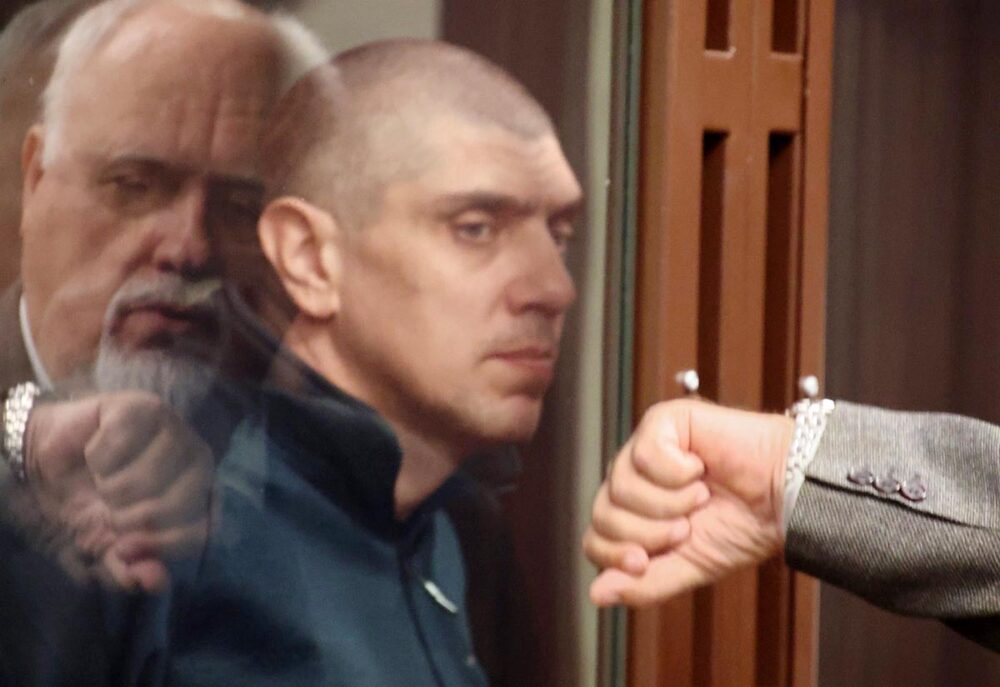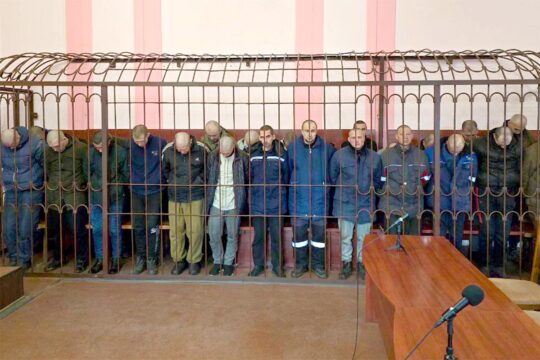In Russia, trials linked to the war in Ukraine got off to a late start. The military court of Rostov-on-Don passed its first sentence on a Ukrainian prisoner of war on June 20, 2023. Denis Muryga, a former soldier of the Ukrainian Aidar battalion, was sentenced to 16 years in a strict regime colony. The Supreme Court of the self-proclaimed Donetsk People’s Republic (DNR) declared Aidar as a terrorist organization in April 2016. It is also considered an illegal armed formation in Russia.
The Southern District Military Court publicly announced the start of the first case involving a Ukrainian prisoner of war on February 23, 2023, just before the first anniversary of Russia’s full-scale invasion of Ukraine. Senior Sergeant Anton Cherednik, a serviceman of the 501st Separate Marine Battalion of the Ukrainian Armed Forces, was accused of seizing power by force, cruel treatment of civilians, murder, and undergoing training for terrorist activities. According to the accusation, on March 27, 2022, Cherednik stopped two men in the town of Mirnoye near Mariupol and ordered them to lie down. They showed him identification documents, but the military demanded that they say a phrase in Ukrainian. Cherednik reportedly shot one of the men, whose pronunciation was not correct.
In a video released by the Investigative Committee of Russia, Cherednik stated that he had no objective reasons to kill the man, and that he regrets what happened. Cherednik told investigators that the detainee “responded normally” but then “made a sudden movement”, and the soldier instinctively shot him. The soldier claimed in court that he did not force passersby to speak Ukrainian. According to him, this accusation was necessary for the investigation to bring a trumped up motive of national hatred. In November 2023, he was sentenced to 19 years of strict regime colony. The charges were based on the testimony of a surviving passerby, two residents of Mariupol who allegedly saw the moment of the murder from a window, and Anton Baydrakov, who patrolled with Cherednik. Baydrakov himself was sentenced to 18 years of strict regime in December 2023 in a similar case.
More public scrutiny in Rostov
Cases in Rostov and in the occupied territories are handled differently. Courts in the occupied territories more often issue verdicts based on charges related to ill-treatment of the population and the use of prohibited methods in an armed conflict. Russia’s Southern Military Court in Rostov often finds captured soldiers guilty on terrorist charges, such as undergoing training for terrorist activities or simply participating in a terrorist organization.
Cases against members of the “Azov” and “Aidar” battalions, which are considered terrorist in Russia, are heard both in the occupied territories and in Rostov-on-Don. However, the mere fact of participation in a terrorist organization is attributed to captured soldiers only in Southern Military Court cases.
Cases tried in the occupied territories are less visible to public scrutiny — almost nothing is known about them except what is officially reported by the Russian Investigative Committee. From the releases of Russian law enforcement agencies, it is impossible to understand when the case came to court, how much time was spent on its consideration, whether the defendants were provided with lawyers, or what arguments the defendants put forward in their defence at the hearings. From this point of view, the situation is better in Rostov: all cases involving Ukrainian prisoners of war are included in the general judicial database, with each case taking over five months to be reviewed, and hearings are most often held in public.
Unofficial “terrorist organization”
More details by far are available about cases heard by the Southern Military Court. For example, in December 2023, this court sentenced Viktor Didyk and his son Roman Didyk, Ukrainian servicemen who were members of the “Dnipro-1” battalion. They were found guilty of participation in a terrorist organization, as well as illegal possession, transportation and carrying of firearms and ammunition.
The volunteer battalion Dnipro-1 was formed in April 2014 based on the patrol service of the special police force within the Ministry of Internal Affairs of Ukraine. It became the first volunteer unit formed in response to demonstrations and seizure of administrative buildings by separatists in the south-eastern regions of Ukraine. Some Russian media called the regiment “punitive” and press releases from the General Prosecutor Office referred to it as a “terrorist organization”, although it is not on the official list of terrorist organizations.
According to public data from the Russian investigation, Roman and Viktor Didyk joined the Dnipro-1 battalion in 2015 and participated in military operations in southeastern Ukraine. They were captured in the spring of 2022 in the village of Rubizhne, in the Luhansk People’s Republic (LNR). Weapons and ammunition were allegedly found with them, which was noted in the indictment. The court sentenced them to eight years in a colony.
Penal colony for a female cook
The average sentence in Rostov is 12 years, while in the occupied territories it is 23 years, not including over 30 life sentences. Remarkably, the military court in Rostov-on-Don has not issued any sentences exceeding 20 years, nor has it handed down any life sentences to Ukrainian prisoners of war. One of its most recent penalties was 5.5 years of penal colony. Natalya Pridatchenko received such a sentence in December 2023. She became the first known woman among Ukrainian prisoners of war to be convicted by Russian courts.
A penal colony in Russia is the most lenient form of imprisonment. Convicts there can wear civilian clothes, communicate freely with relatives by phone and during visits, and receive an unlimited number of parcels. Ukrainian prisoners of war are usually sent to special and strict regime colonies, where there are limited visits and phone calls, and stricter daily schedules.
According to Russian investigators, in January 2020 Pridatchenko signed a contract with the Armed Forces of Ukraine and was assigned to the 24th Separate Assault Battalion Aidar, where she worked as a cook. Pridatchenko worked there for less than a year, until April 2021. Although Aidar was only recognized as a terrorist organization in Russia in the autumn of 2023, she was still accused of participating in a terrorist organization. The date of Pridatchenko’s arrest is unknown, but according to the human rights center Memorial, after the start of the full-scale invasion she lived in Severodonetsk, Luhansk Region.The Southern Military Court continues to consider two major cases involving nearly 40 Ukrainians allegedly members of the Azov and Aïdar battalions. The next hearings in these cases are scheduled for March 20 and March 28 respectively.







